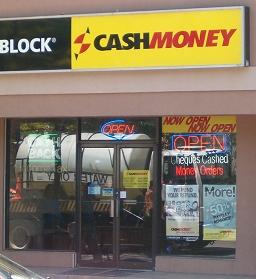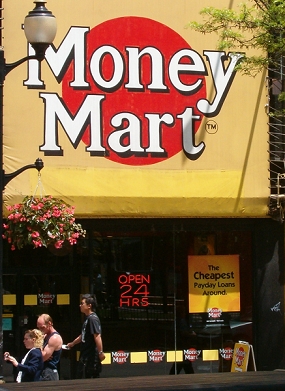Payday loan businesses seem to be popping up all over the place. These businesses offer cash advances based on your income that must be paid back on your next payday. Their clientele are often low-income earners. When I came across an article about a proposed law in Manitoba that is seeking to regulate interest rates in the province as a “crack down” on these businesses, I thought I’d look into this a little myself.
In Canada, it’s a criminal offence to charge an annual interest rate that is greater than 60 percent. That means that if I were to borrow $1000 for one year, the most anyone could charge me in interest is $600 – things get more complicated if the interest is compounded in periods less than year (like monthly) which is usually the case (and you end up paying more), but I’ll ignore that for now to keep it simple. With that information in mind, I headed downtown to check out two payday loan businesses right across from each other in Gore Park – CashMoney and MoneyMart.
My first stop was CashMoney. Attached to H & R Block in downtown Hamilton, CashMoney has a small location with just one cashier. There were no customers when I arrived, so I was able to stroll up to the front counter – protected by a thick bullet-proof pane of glass – and speak with the cashier immediately.
I asked her a few questions about their service. All you have to do is provide a paystub, a bank record, proof of address and some ID. Then you tell them the amount of the advance you’d like and they calculate how much you need to pay back on your following payday. After writing them a post-dated check dated to your next paycheck for the amount you need to pay back, you get your advance. It’s that simple.
I asked her how much I would end up paying in “interest”. Well, she didn’t call it interest and she didn’t call it service charges either. She said, “You pay $22 on every $100 you get advanced.” I asked her again just to clarify – yup, it’s $22 for every $100.
Assuming a standard scenario where you get paid every two weeks, we can work out the annual interest rate easily. Twenty-two dollars per every $100 is 22 percent over two weeks. There are 52 weeks in a year, which works out to 26 two-week periods. Twenty-two percent multiplied by 26 is 572 percent!

Offering a 50% advance on your paycheck…
I grabbed a couple of pamphlets, including one on responsible borrowing, and headed across the street to MoneyMart. There were three cashiers on duty and a lineup. I took a couple more pamphlets and read them while I waited.
The fees for advances were clearly outlined on the pamphlets. To get a fast cash advance, you pay interest at an annual rate of 59 percent (note they come in just under the 60 percent law), which as the pamphlet describes works out to 89 cents per week per $100. Pretty cheap compared to CashMoney, I thought.
But wait – there’s more. As well as the interest, you pay what MoneyMart calls “1st party check cashing fees”. Those fees? $7.99 per check, plus 9.99% of the face value of the check.
So what does that work out to? MoneyMart lets you borrow from $100 to not more than 30 percent of your net pay, up to a maximum amount of $1500. Let’s say you make $1200 net every two weeks. That means they’ll front you 30 percent, which is $360. So if we look at service charges like interest rates, what’s the total interest rate you’ll pay?
It’s a bit more complicated than CashMoney, but here goes. You pay $6.41 in regular interest, calculated at 59 percent over the year. You also pay a flat rate of $7.99 and 9.99 percent of the $360, which works out to $35.96, for a total payment of $50.36. This works out to an annual interest rate of about 260 percent!
I asked the cashier at MoneyMart what would happen if the post-dated check I wrote to cover my advance bounced. “It’s a $35 NSF charge”, she said, “in addition to the NSF charge your bank will charge you. You don’t want to do that!” No, I don’t, and I don’t imagine anyone does. But what about the people who do? Can they afford that tacked on to an already expensive loan?

The cheapest payday loans around aren’t that cheap…
This is what is bothering anti-poverty groups. Harold Dyck, from the Social Planning Council of Winnepeg, as quoted in the article I linked to above:
“It does particularly victimize people in the most desperate of circumstances. The general term they use to describe it is the alternative consumer credit market. It’s a bit of a fancy title for a way of essentially soaking people in poverty and just aggravating their condition.”
Of course, the pamphlets and the advertising for these businesses clearly state that this is for short-term loans only, and in order to belong to the Canadian Association of Community Financial Service Providers, you have to prohibit “roll-overs” – the practice of extending loans or of allowing people to take out a new loan to cover their old one. These conditions sound a bit like the “for tobacco use only” stickers on the bongs at the local hemp shop. Are they taken seriously? And is there anything stopping someone from covering an advance from CashMoney with an advance from MoneyMart?
I called CashMoney to find out, and to see what they had to say about an interest rate for their loans that I calculated at 572 percent annually, far in excess of the legal limit. “Is there anything in place to stop someone from covering a cash advance from CashMoney with a cash advance from somewhere else, like MoneyMart?” I asked. “No,” Heidi explained, “it’s two different companies. There’d be no way we could know that”.
I confirmed with her that CashMoney charges $22 on every $100 advanced, and then explained that I had worked that out to an annual rate of 572 percent. “It’s not interest,” she said, “it’s just a fee.” But isn’t that fee essentially interest under a different name? She was adamant – “it’s not interest. It’s a fee.”


 twitter.com/adriandz
twitter.com/adriandz
